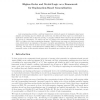Free Online Productivity Tools
i2Speak
i2Symbol
i2OCR
iTex2Img
iWeb2Print
iWeb2Shot
i2Type
iPdf2Split
iPdf2Merge
i2Bopomofo
i2Arabic
i2Style
i2Image
i2PDF
iLatex2Rtf
Sci2ools
129
click to vote
ICML
1989
IEEE
1989
IEEE
Higher-Order and Modal Logic as a Framework for Explanation-Based Generalization
Logic programming provides a uniform framework in which all aspects of explanation-based generalization and learning may be defined and carried out, but first-order Horn logic is not well suited to application domains such as theorem proving or program synthesis where functions and predicates are the objects of computation. We explore the use of a higher-order representation language and extend EBG to a higher-order logic programming language. Variables may now range over functions and predicates, which leads to an expansion of the space of possible generalizations. We address this problem by extending the logic with the modal operator (indicating necessary truth) which leads to the language λ Prolog. We develop a meta-interpreter realizing EBG for λ Prolog and give some examples in an version of this extended abstract which is available as a technical report [2].
ICML 1989 | Logic Programming | Machine Learning | Meta-interpreter Realizing Ebg | first-order Horn Logic |
Related Content
| Added | 11 Aug 2010 |
| Updated | 11 Aug 2010 |
| Type | Conference |
| Year | 1989 |
| Where | ICML |
| Authors | Scott Dietzen, Frank Pfenning |
Comments (0)

